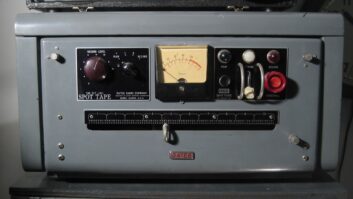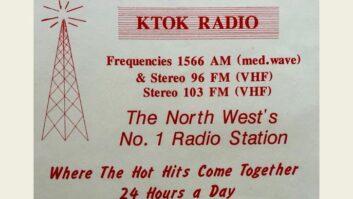To save $9.5 million in 2019, the U.S. government’s Arabic language broadcaster Radio Sawa plans to restrict its FM and AM transmissions to Iraq. This will mean the end of Radio Sawa’s radio service, AM and FM, to the rest of the Middle East.
In addition, Radio Sawa’s country-centric feeds for Egypt, the Gulf, Jordan, Lebanon, Mauritania, Morocco and Sudan will be terminated, both on air and online at www.radiosawa.com. The remaining Radio Sawa Iraq feed will be streamed.

Cuts to Radio Sawa are part of a bigger reduction for the Broadcasting Board of Governors in proposed federal budgets for FY 2018 and 2019. Billing itself as “America’s civilian international media agency,” the BBG oversees the Voice of America (VOA), Radio Free Europe/Radio Liberty (RFE/RL), Radio Free Asia (RFA), Alhurra TV and Radio Sawa (under Middle East Broadcasting Networks — MBN), and Radio and TV Martí. The BBG budget was proposed at $661.1 million for FY 2019, down from $685.2 million in 2018 and $786.6 million in 2017.
A BBG information page says, “Radio Sawa attracts young audiences by playing contemporary Arabic and Western music with news and information programs. It is one of the most popular radio stations in the countries where it can be heard on FM.” So why is the BBG reducing Radio Sawa from a Middle Eastern regional broadcaster to an Iraq-only station?
“Tough trade-offs are always necessary in austere budget climates,” replied Nasserie Carew, BBG’s director of global communications and public affairs. “But BBG and MBN leadership are committed to and will continue reaching people in media-restrained countries.”
With money being tight, Radio Sawa’s non-Iraq radio broadcasts were a natural target, according to interested observers.
“Eliminating the Radio Sawa network of transmitters in all countries except Iraq will save almost $5 million,” said Kim Andrew Elliott. He’s a retired VOA audience research analyst and broadcaster who now produces Shortwave Radiogram a weekly program of text and images via analog shortwave radio.
“Radio Sawa uses leased FM transmitters in Arab countries, plus mediumwave (AM) relays,” he said, “and these are expensive.”
HEARTS AND MINDS
Launched 16 years ago, Radio Sawa is a 24/7 Arabic-language broadcaster meant to attract and influence young Middle Eastern listeners. It replaced the VOA’s Arabic language service, which was viewed by many in Washington as ineffective in wooing regional hearts and minds.

To win over this populace, “Radio Sawa reaches audiences in Arabic with a mix of Western and Arab popular music,” said Elliott. “This format is designed to attract a young audience to the news and current features content audience also broadcast by Radio Sawa.”
If one goes by Radio Sawa’s numbers, the service is doing pretty well. “Radio Sawa currently has a weekly reach of 11.7 million,” said BBG’s Carew. “Radio Sawa’s largest broadcasting stream is to Iraq, where it reaches 4.7 million listeners, 40 percent of the audience, who will continue to be served by both radio broadcasts and digital initiatives.”
It is these digital initiatives that the BBG is hoping will fill the gap created by Radio Sawa’s transmission cuts. Overall, “MBN’s digital outlets have grown to a weekly reach of nearly 6 million,” said Carew. “Additionally, Radio Sawa’s Facebook page has 7.5 million followers.”
Nevertheless, starting in 2019, some 7 million Radio Sawa listeners outside of Iraq will no longer be able to tune in via radio. That is 60 percent of the station’s current audience.
As a result, the cuts to Radio Sawa’s terrestrial service will “almost certainly” lead to audience losses, said Chris Greenway, assistant editor with BBC Monitoring. “Clearly not everyone in the Arab world is willing or able to receive radio broadcasts via non-traditional means. In-car listening is an obvious example.”
WILL DIGITAL BE ENOUGH?
Even without budget cuts, the fact that Radio Sawa is putting more emphasis on the web comes as no big surprise. “The BBG proposal is in line with its policy of moving out of both shortwave and AM broadcasting, which has been under way for some years now,” said Greenway.
The BBG isn’t alone in choosing lower-cost digital over broadcasting. The BBC, too, has radically scaled down its global shortwave service in favor of web streaming, and many other international broadcasters have followed suit. Some, like Radio Canada International, have stopped broadcasting entirely, choosing instead to only stream content over the internet.
This said, a big question remains: Will Radio Sawa’s young listeners outside of Iraq tune into its content via the web? The BBG hopes the answer is yes.
After all, “Radio Sawa was established in 2002 to appeal to younger, non-traditional news seekers,” said Carew. “Audiences change and now, more than ever, the younger generation is moving towards digital outlets for their news and information. MBN will continue to expand on that content to give digital audiences news and information in a way that will appeal to them.”
Mindful that such a migration isn’t a slam-dunk, “Three million dollars will be added back to the Radio Sawa budget to ‘reposition’ it as ‘digital,’” said Elliott. “Presumably this will means delivering the content to mobile devices, which are increasingly used everywhere.
“It’s an interesting question how owners of mobile devices prefer to be entertained and informed,” he continued. “Will they listen to something that sounds like a radio station through those devices? Or do they prefer to access individual segments of content on demand? Do they want to read the content, view it as video, listen to it as audio, or some combination? This is best determined by studying the actual consumption behavior of mobile device owners in the region.”
The BBC’s Greenway also has concerns about Radio Sawa’s fate. “Some listeners may take the trouble to switch to listening online, via a phone app, or via satellite,” he said. “But others won’t want to or be able to.”
He said, “It’s worth noting that the Paris-based Arabic-language Radio Monte Carlo Doualiya and the BBC Arabic service will continue to be broadcast to the Middle East on powerful AM transmitters, and so could provide a ready-made alternative for listeners who will miss the presence of Radio Sawa on the AM band.”
“The BBC has cut back its Arabic broadcasts on AM to just the evening and early morning, but Radio Monte Carlo Doualiya is still on the air for 17 hours a day. And, like Radio Sawa, it airs a high component of music.”
Radio Sawa will answer the questions above by cutting its non-Iraq AM/FM broadcasts and then seeing how many of Radio Sawa’s dispossessed radio listeners follow it to the web. As well, relying exclusively on the web appears to put Radio Sawa’s content at the mercy of the non-Iraq Middle Eastern countries it hopes to influence, because their governments can block Radio Sawa’s website whenever they see fit.
The result: “As more and more countries use more and more sophisticated means to block internet content, this budget cut could reduce Radio Sawa’s ability to circumvent the interdiction of information delivered via the internet,” said Elliott.







